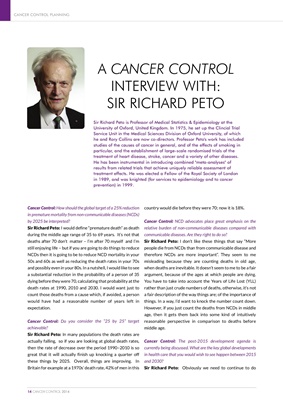
things that reduce the probability of death before middle
age: child survival, safe motherhood, HIV control, prevention
of accidents and violence. Having said that, there is a lot that
can be done to reduce the incidence of, and to improve the
treatment of, non-communicable disease.
Cancer registration
I think that it will be important to keep cancer registration
going because the circumstances of the different registries
around Africa are quite different. It has taken a long time to
establish cancer registration. Their recording rates are very,
very different from the rates seen among black Amercians in
the United States. And so it will be important to continue to
monitor what the real evidence is on cancer incidence rates
in different African populations.
Treatments
We need treatments that work to be affordably available,
and used. In some cases this involves surgery and services
like that but a lot of it involves the appropriate use of a fairly
limited number of drugs that are out of patent and work. For
example, for breast cancer Tamoxifen and aromatase
inhibitors are out of patent.
Secondary prevention
My first target on medication for reducing NCDs would be
secondary prevention: people who have actually got some
disease. How do we get drugs that work affordably available
and used for the treatment of people with disease?
Remember, you're not medicalizing the population; these are
people that have already got the disease, they have come to
you. Their absolute risk of things going wrong is quite high
so their absolute benefit per thousand treated is much
greater than in primary prevention. They are motivated to
comply with medication yet we are getting dismally low
rates of usage worldwide of drugs that should be available as
low cost generics. If you want to get death rates down
reasonably soon, then secondary prevention needs to be
really thought about. What are the logistic problems in
getting approved drug lists? What are the problems with
getting things available at low cost?
But if you really want to do something about noncommunicable disease, then tobacco is just enormous.
Cancer Control: People are also beginning to talk about "the end
game" in tobacco control.
Sir Richard Peto: Yes, very gimmicky. We're living in a world
where tobacco sales are rising rapidly. Over the last 14 years
in China you have had a 25% increase in tobacco. There are
three things that we could do to reduce premature mortality
from NCDs.
Increase taxation of tobacco
There ought to be a substantial increase in taxation on the
number of cigarettes sold. The best example of this is France.
Between 1990 and 2005 the French tripled the real price of
cigarettes so there was a 200% increase in price.
Consumption halved and the French government take from
tobacco sales went from 6 billion real Euros to 12 billion real
Euros. So my slogan would be: Triple - Half - Double: triple
your price, halve the consumption and double the amount of
money the government makes.
When China tried to increase prices a few years ago they
put the price increase only on the high cost brands; the
cheaper brands - which were the majority - didn't change in
price at all. If you can't afford the increased price of the high
price brands you go down to a cheaper brand, so it didn't
reduce sales. Whereas if you can put all cigarette prices up,
including the cheapest, then it does have an effect on sales.
China gets 10% of the government tax take from tobacco so
if they could push that up to 12% or 15% by increasing the
price of cigarettes. That's probably the biggest single thing
China could do for non-communicable disease because
Chinese men are 8% of the world's population and smoke a
third of the world's cigarettes.
Smoking cessation
Let's forget 2025 and think instead of 2050 as an end date.
We've got to say that the key determinant for noncommunicable disease is when adults quit smoking before
2050 rather than whether kids start. If we want to talk
about tobacco deaths then they are going to be driven
mainly by whether adults have stopped smoking. It does
matter whether kids start smoking but that relates to the
deaths in the second half of the century. Also, plain
packaging: the tobacco industry is not at all happy when you
try to impose plain packaging or advertising bans. They hate
that, so I am inclined to trust them in that. I think plain
packaging is doable.
Death registration
As well as doing something about the tobacco epidemic, we
ought to be monitoring how it is going. The hazard per
smoker will change over decades and we need to have an
idea of the extent to which smoking is causing death in the
population. I would argue for countries including in their
death registration processes a new question: "Was the dead
person a smoker five years ago? Yes/No/Don't know".
CANCER CONTROL PLANNING
CANCER CONTROL 2014 15